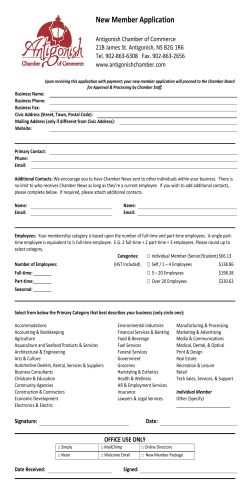
Joint Foreign Chambers of the Philippines
Joint Foreign Chambers of the Philippines American Chamber of Commerce of the Phils., Inc. Australian-New Zealand Chamber of Commerce (Phils.), Inc. Canadian Chamber of Commerce of the Phils., Inc. European Chamber of Commerce of the Phils., Inc. Japanese Chamber of Commerce & Industry of the Phils., Inc. Korean Chamber of Commerce of the Phils., Inc. Philippine Association of Multinational Companies Regional Headquarters, Inc. April 28, 2015 HON. ARSENIO BALISACAN Director General Socioeconomic Planning Secretary National Economic and Development Authority NEDA Building, Josemaria Escriva Drive 1605 Pasig, Metro Manila Dear Secretary Balisacan: The Joint Foreign Chambers applaud and appreciate the continued efforts of the National Economic Development Authority (NEDA) to consider various means by which foreigners may contribute to the country’s economic development. It has come to our attention that the Department of Trade and Industry (DTI) is interpreting the Foreign Investment Act (FIA) in a manner that impairs foreign residents in doing business in the Philippines. In particular, the DTI maintains that a foreigner who wishes to do business as a sole proprietor is a “domestic market enterprise” and hence required to invest the equivalent of $200,000 in paid-up equity capital before being registered. See Attachment 1. We have trouble understanding this interpretation for at least two reasons. First it is apparent from Section 5 of the FIA that "non-Philippine nationals" may "do business" as "single proprietorships" as an alternative to investing in domestic market enterprises. See Attachment 2 for an annotated excerpt from this law. Second, “paid-in capital” is a concept pertinent to investments in corporations, not sole proprietorships.1 We are unaware of an authoritative definition of paid-in capital that contemplates its use outside the corporate context. Currently tens of thousands of foreigners reside in the Philippines. Many have skills and knowledge that could contribute to the economy. For instance, an artist might wish to sell jewelry wholesale or a seasoned consultant may wish to offer business advice on a part-time basis. Various constraints, however, such as work permit requirements, or the requirement of establishing 60 percent majority-Filipino-owned company discourage them from doing so. This is particularly acute with respect to 1 Paid-in capital is commonly defined as "capital contributed to a corporation by investors through purchase of stock from the corporation.” See, e.g., Google E-Study Guide for Business Essentials and Wikipedia. part-time, contract-based work, which is becoming more and more the trend both here and globally. We believe that the time is right for NEDA, under its statutory authority, to consider the issuance of new regulations that would clarify the intent of Section 5 that sole proprietorships are not domestic market enterprises. Such a change would allow foreigners to register and do business in non-protected sectors of the Philippine economy. Restrictions in the professions or retail trade would not be affected. Such reform would increase tax revenues (the sole proprietors would presumably be issuing official receipts and paying VAT and income tax) and could lead to greater investment and use of more traditional corporate vehicles as various foreigners succeed in their efforts.2 Previously we have applauded your public statements regarding NEDA’s efforts to find ways to open up the economy via changes to various laws. However, as we know, such efforts take time and have uncertain outcomes. This is an opportunity for NEDA and this administration, through the mere issuance of a clarifying regulation, to remove a constraint to doing business in the country and to harness the skills and knowledge of thousands of residents. We look forward to discussing this matter further with you. We are also ready to provide assistance with drafting, research etc., should you think this is a matter worth moving forward on. Regards, RHICKE JENNINGS President American Chamber of Commerce of the Philippines Inc. JULIAN PAYNE President Canadian Chamber of Commerce of the Philippines, Inc. TOM GREALY President Australian-New Zealand Chamber of Commerce of the Philippines Inc. MICHAEL RAEUBER President European Chamber of Commerce of the Philippines, Inc. 2We very much doubt that few, if any, foreign sole proprietors would maintain this structure for doing business once he or she begins hiring employees. The risk of personal unlimited liability would deter most from doing so. YOSHIO AMANO President Japanese Chamber of Commerce & Industry of the Philippines, Inc. HO-IK LEE President Korean Chamber of Commerce of the Philippines, Inc. SHAMEEM QURASHI President Philippine Association of Multinational Companies Regional Headquarters, Inc. Cc: DTI Secretary Gregory L. Domingo PRC Chairman Florentino C. Doble DTI Undersecretary Nora K. Terrado
© Copyright 2026












